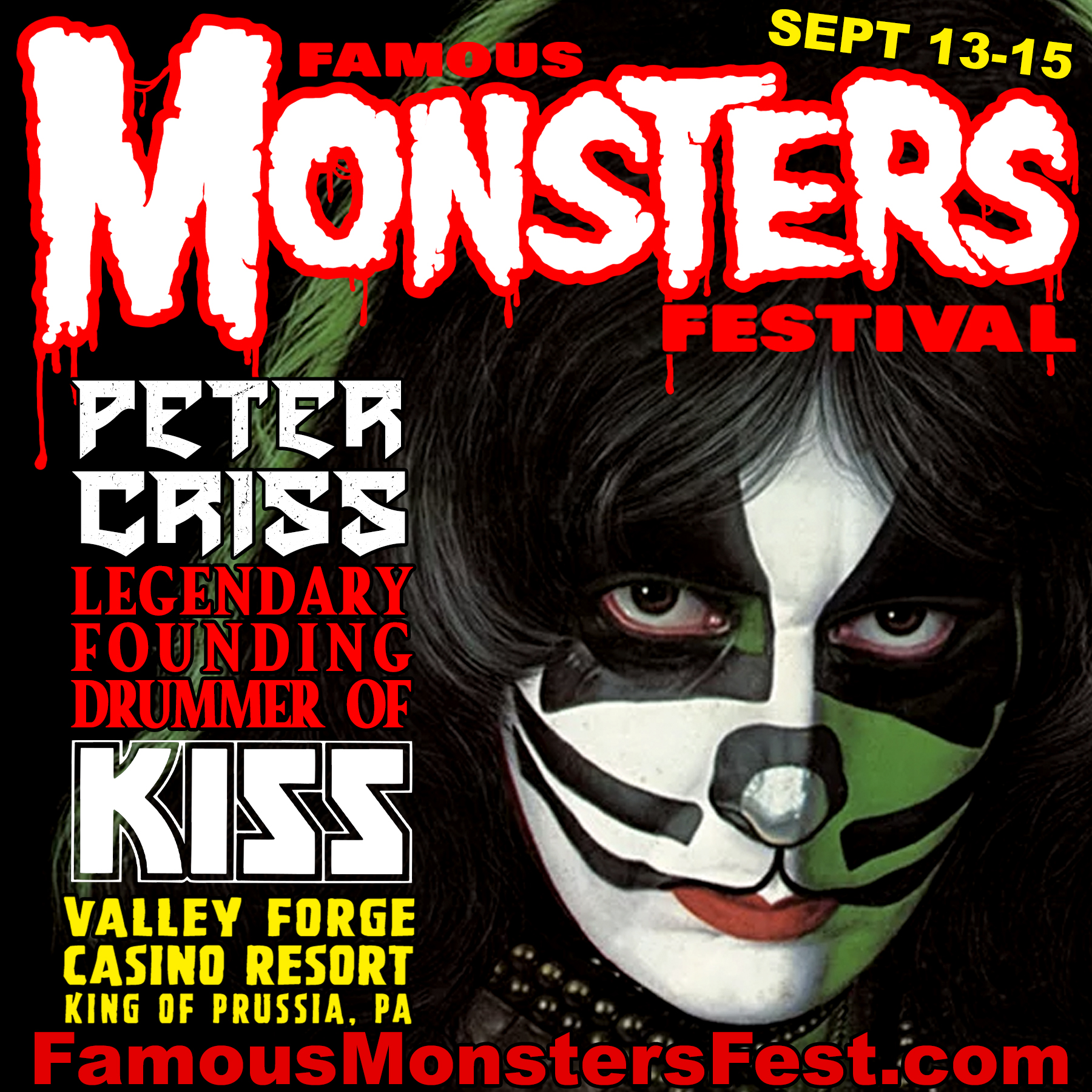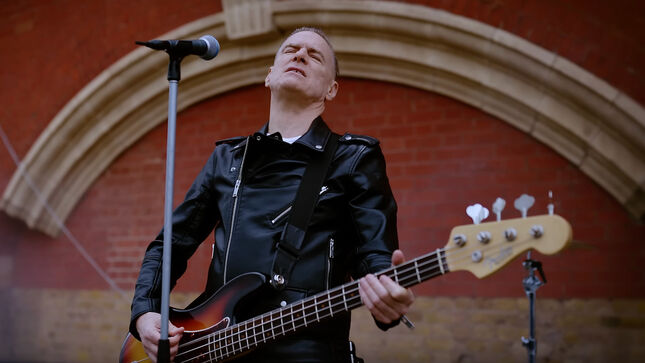Author Archives: Steve Stierwalt
“I was never fired from Kiss – I was left behind for a wildly successful commercial venture. You don’t have to be an accountant to understand Paul and Gene”: Bruce Kulick shares war stories from Kiss’ no-makeup era – and the reunion that killed it
Kulick offers a front-row perspective of what went down with Kiss in the ’80s: the tension between the past and future, his six-string independence from Ace Frehley, and the coming grunge asteroid
KISS – MTV Unplugged Rehearsals: August 5, 1995 (4K Part 1)
Original KISS Drummer PETER CRISS To Appear At Next Month’s FAMOUS MONSTERS FESTIVAL

Original KISS drummer Peter Criss will appear at the Famous Monsters Festival at the Valley Forge Casino Resort in King Of Prussia, Pennsylvania next month. The legendary 78-year-old rocker will meet fans on Friday, September 13 and Saturday, September 14 only.
Friday, September 13, 2024
6:00 p.m. to 10:00 p.m.
Saturday, September 14, 2024
12:30 p.m. to 7:00 p.m.
* No tableside selfies allowed
* Maximum of five items signed per guest/family
* No outside drumheads or drum parts
Drumheads will be available at the event at Peter‘s table, with proceeds going to charity.
Says Peter: “I’m looking forward to seeing you all. Safe travels and I will see you all soon!!! God bless.”
KISS Eric Carr Paul Stanley 1989 MTV Afternoon Hosts
Balance Breakin’ Away Solid Gold with Bob Kulick
Dale Torborg BLOODY FUNKO POP THE DEMON KISS #121 SIGNED in Red
Dale Torborg The Demon signed in red paint pen. Very hard to get. Dale signed a couple of these for us in Daytona, FL in 2024. Comes with our Certificate of Authenticity. Includes Demon Face Dale Torborg pick and protective case.
Smashing Pumpkins – Black Diamond
BRUCE KULICK – “CREATURES OF THE NIGHT” – KISS CANCER GOODBYE
Gene Simmons Band – Are you ready, Utrecht, 04-08-2024
Gene Simmons Calls Out Olympic Disrespect Towards KISS

Gene Simmons was disappointed with the stage setup in the 2002 Olympics closing ceremony in Salt Lake City.
KISS stole the show with their performance of ‘I Wanna Rock and Roll All Nite.’ They had exploding fireworks and heavy guitars. Simmons later said the following about the show:
“It was probably the smallest stage we’ve ever played on. And right in front of us was ice, ice skaters, and we had to stay on that truck platform and the amplifiers were far off in the stands. I was told that two billion people could watch the Olympics on earth and that’s sort of a big deal.”
In 2018, the bassist spoke with the official website of the Olympics and talked about what he remembered from the performance:
“I remember seeing the champion athletes from different countries, different nationalities, different races and different religions all getting together and not worrying about where somebody was from or what language they spoke. The Greeks started this a long time ago and… what a wonderful idea! The Olympics are one of the bright spots on a very tainted human history. If aliens landed on earth and gave us an overview they would say, ‘You guys did a lot of bad stuff, the Inquisition, the Nazis of World War II, all sorts of things. But you did some cool stuff. The Emancipation Proclamation, Magna Carta, the Olympics…’”
Gene also reflected on the atmosphere in the stadium:
“You can’t help but smile. There are people that are holding hands and putting their arms around each other who, if they went back to their countries or borders that separate them, wouldn’t necessarily do that. And I’m using kind language. Elsewhere, enemies in the Olympics unite over a bigger idea than borders and separation of people.”
Acclaimed Drummer PAT GESUALDO Featured Alongside Iconic Rockstars On Charity CD To Help Bring Free Music Programs To Special Needs Kids Bruce Kulick
![]()
Acclaimed studio/touring drummer / author / clinician, Pat Gesualdo, has recorded the drum tracks on the Metal Hall Of Fame All Stars CD/DVD. The charity project is a release from Deko Entertainment / ada / Warner Music Group, and helps bring free music programs to special needs children in health facilities and community centers. This once in a lifetime collaboration of rockstars is huge news for music fans across the globe.
The Metal Hall of Fame All Star Charity CD features Rudy Sarzo, (Whitesnake), Bruce Kulick (KISS), Bob Daisley (Ozzy Osbourne, Rainbow), Chris Poland (Megadeth), guitarist Tony MacAlpine, and Chris Impellitteri (Impellitteri), It also features a jam from the Annual Metal Hall Of Fame Celebrity Gala that includes Steve Vai (David Lee Roth), Geoff Tate (Formerly Queensryche), guitar virtuoso Joe Satriani, Bjorn Englan (Yngwie Malmsteen/Dio Disciples), Chris Poland (Megadeth), and studio/touring drummer Pat Gesualdo. Additional tracks feature outstanding performances by Mike Tirelli (Holy Mother), Mike Orlando (Adrenaline Mob), Derek Sherinian (Dream Theater) and Michael Romeo (Symphony X).
Gene Simmons Demon Backpack On Sale!
UNION – Do Your Own Thing Live (Full Concert)
Bryan Adams – Rock And Roll Hell Video
MUSIC SCENE: Gene Simmons, Ace Frehley booked by The Riv

It’s been more than 23 years since Ace Frehley and Gene Simmons shared a stage as members of KISS. Simmons and Paul Stanley were the iconic rock band’s only constants during its five-decade run. The original lineup’s first run, which included drummer Peter Criss, only lasted seven years, but the four original members remain a sentimental favorite of KISS fans.
The original four reunited in 1996, but on April 13, 2001, Ace played his last show with KISS. As has become commonplace with classic rock bands, the band replaced Frehley and continued for another 22 successful years, culminating in an extended farewell tour that ended on Dec. 2, 2023.
Later this month, in North Tonawanda, Simmons and Frehley will be performing on the same stage 48 hours apart. It may be the closest thing to a reunion the two former bandmates will ever have, and it is definitely a rare occurrence. The pair last shared a stage during an Australian tour in 2018.
The Gene Simmons Band will headline a fundraiser for the West Herr Riviera Theatre’s lobby expansion project on Aug. 19. Frehley arrives two days later, on Aug. 21. While it would be a dream come true for Simmons and Frehley to appear onstage together and rock and roll all night, there is little chance it will happen.
Frehley performs in Washington on Aug. 17 and has a three-day break before the Riv show. Simmons has a six-month break after his Riv performance.
Nevertheless, KISS fans will have a unique opportunity to hear at least a few songs performed by both groups, including “Deuce,” “Shout It Out Loud,” and “Rock and Roll All Nite.” With more bands having full lineups that were not on the original recordings, KISS fans will be treated to different performances of two artists that actually played on the hit songs fans grew up listening to on the radio.
Come Meet Peter Criss at Valley Forge Casino Resort for Famous Monsters Festival King of Prussia, PA 2024!!! Friday & Saturday, September 13th & 14th, 2024 ONLY!

Friday & Saturday, September 13th & 14th, 2024 ONLY!
Friday, September 13th, 2024
6:00pm to 10:00pm
Saturday, September 14th, 2024
12:30pm to 7:00pm
Meet & Greet with Peter Criss!
Purchase Event Tickets & Peter Criss Pro Photo Op Tickets HERE!
*No tableside selfies allowed*
Maximum of 5 Items Signed Per Guest/Family
***NOTE: Peter will not sign copies of Nothin’ To Lose,
Sealed With A KISS, or Behind the Mask.
No outside drum heads or drum parts.
Rockologists remake of “Let Me Rock You” and “Out Of Control” will not be signed.
Only the original releases from Casablanca Records will be signed.
Drum heads will be available at the event at Peter’s table with proceeds going to charity.
For any additional questions, please email
axe@famousmonsters.com
BRYAN ADAMS Announces Double A-Side Single Featuring Songs Written For KISS’ Creatures Of The Night Album; “Rock And Roll Hell” Music Video Streaming

Bryan Adams is releasing a special double A-side single featuring two songs – “War Machine” and “Rock And Roll Hell” – through his new independent label, Bad Records. These songs were originally written by Adams, Jim Vallance, and Gene Simmons for KISS’ 1982 album, Creatures Of The Night.
Available for pre-order now as a limited edition double A-side 7” single, available exclusively via Bryan’s webstore (releasing August 30, 2024).


